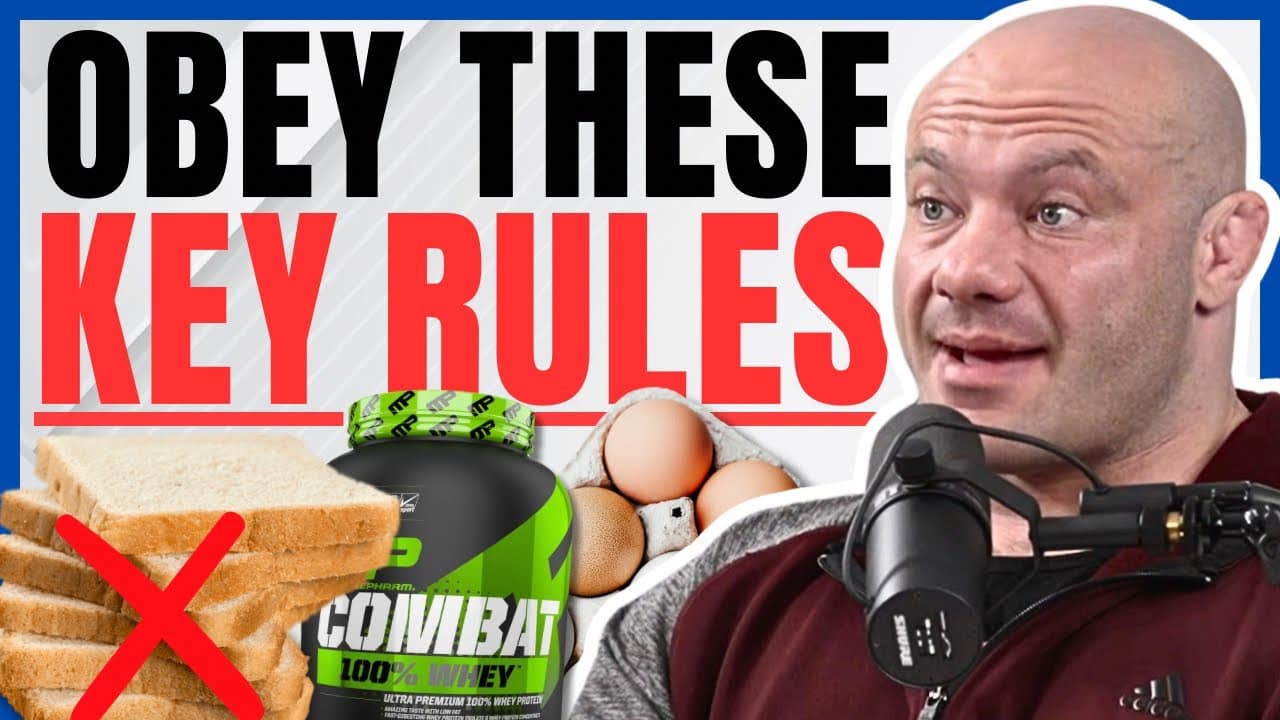Dr. Mike Israetel’s Ground Rules for Losing Fat and Building Muscle at the SAME TIME
27 Apr 2024 (over 1 year ago)

Intro (0s)
- Sleep is crucial for optimal health, fitness, and performance.
- Prioritize sleep over excessive work.
15% off Bon Charge's Sauna Blanket (56s)
- Bon Charge's sauna blanket is recommended for those without space for a large sauna.
- It's an infrared sauna blanket with low EMF and can reach temperatures over 170°.
- Benefits include heat shock proteins, lymphatic system support, brain health, and improved sleep.
- Portable and easy to use, making it suitable for travel and small spaces.
- Discount link available in the video description.
Be a Beginner (1m56s)
- Beginners can build muscle and lose fat simultaneously by maintaining their body weight and eating a healthy diet, especially during the first year of training.
- Instead of cutting or bulking, beginners should focus on developing good habits and maintaining their weight.
- After a year, beginners can consider cutting fat for 3 months to improve their body composition further.
- Nutrient quality impacts longevity and body composition.
- Nutrient-dense whole foods help maintain a calorie deficit without deprivation and provide essential vitamins and minerals for muscle growth and recovery.
Resistance Training & Body Recomposition (7m22s)
- Resistance training is the ultimate potentiator of body recomposition because it's a pure hypertrophy driver.
- Eating a hypercaloric diet potentiates muscle growth but also increases body fat.
- Lifting weights alone has no effect on body fat, but can cause a slight decrease.
- With resistance training, you can burn fat and build muscle simultaneously, especially for beginners.
Building Muscle in a Caloric Deficit (8m10s)
- Putting advanced lifters in a 500-1000 calorie deficit while maintaining high protein intake can prevent muscle loss.
- High protein intake (around 1 gram per pound of body weight) helps secure against muscle loss during a deficit.
- Resistance training is also effective in preventing muscle loss during weight loss.
- Many people who lose weight without resistance training lose muscle mass, resulting in a less toned appearance.
How to Resistance Train for Muscle Growth (10m37s)
- Resistance training is essential for preserving muscle while losing fat.
- Hit each muscle you want to maintain with 3-7 sets per session, 2-4 times per week.
- Females need more frequent training due to smaller muscles and faster recovery.
- Train each muscle group at least twice a week for females and 2-4 times per week for males to prevent muscle loss.
- Prioritize training muscles you want to develop to avoid muscle breakdown.
- Training provides a stronger stimulus for muscle maintenance compared to nutrition alone.
- During fasting, training helps preserve muscle by signaling the body that certain muscles are necessary for survival.
- Losing muscle during fat loss can have negative consequences, especially for older individuals who may lose strength and functional ability.
- Muscle is metabolically active and helps maintain overall health, making it important to preserve during fat loss.
Resistance Training & Hunger (17m0s)
- Resistance training can help reduce the intense hunger caused by muscle loss during a diet.
- Building muscle while losing fat can lead to better physical appearance and increased attention from others.
- Losing muscle during a diet can lead to intense cravings and a higher likelihood of rebound weight gain.
Resistance Training is a Health Panacea (18m8s)
- Resistance training can significantly reduce the insatiable cravings that arise from muscle loss.
- Resistance training, combined with adequate protein intake, can improve overall health and well-being.
- Resistance training should be an essential part of any fat loss or weight loss diet for health reasons.
- Resistance training provides numerous health benefits, including improved physical appearance, better mood, and increased energy levels.
Sleep (19m46s)
- Sleep is crucial for health, body composition, and performance.
- Lack of sleep can lead to muscle loss and fat gain.
- Sleep is a non-negotiable component for achieving fitness goals.
- Prioritize sleep over late-night workouts or social events.
- Sleep is essential for optimal health, body composition, and performance.
What to do After a Night of Poor Sleep (24m20s)
- Avoid massive cheating as appetite for junk food increases with sleep deprivation.
- Have protein bars and good food.
- Minimize stress.
- Train hard and maintain adequate nutrition.
- Prioritize fixing sleep issues as the number of consecutive nights of poor sleep increases.
- Plan the evening of the second day to ensure good sleep.
- Avoid social outings that may interfere with sleep.
- Aim for 10 hours of sleep to compensate for lost sleep.
- Start winding down and preparing for bed earlier than usual.
- Consider getting a hotel room for a good night's sleep if experiencing multiple consecutive nights of poor sleep.
- Avoid stressing about falling asleep, as it can worsen the problem.
How to Get Ready for Sleep (27m46s)
- Stop trying to sleep.
- Set up conditions for good sleep: cool, dark, quiet room.
- If not sleepy, do a relaxing activity that is slightly boring.
- Avoid overly stimulating activities before bed.
- If unable to fall asleep after 15-20 minutes, get out of bed and do another relaxing activity.
- Don't associate bed with being awake.
Where to Find More of Dr. Mike's Content (30m12s)
- YouTube: search RP strength or Dr m is Rell.